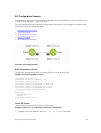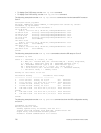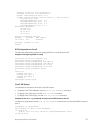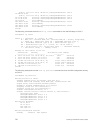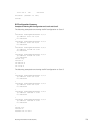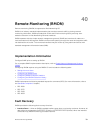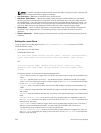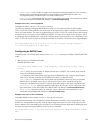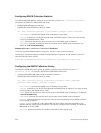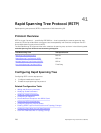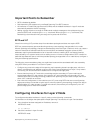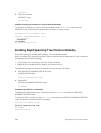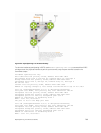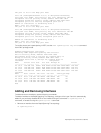
– event-number: event number to trigger when the falling threshold exceeds its limit. This value is
identical to the alarmFallingEventIndex in the alarmTable of the RMON MIB. If there is no
corresponding falling-threshold event, the value should be zero.
– owner string: (Optional) specifies an owner for the alarm, this setting is the alarmOwner object
in the alarmTable of the RMON MIB. Default is a
null-terminated string.
Example of the rmon alarm Command
To disable the alarm, use the no form of the command.
The following example configures RMON alarm number 10. The alarm monitors the MIB variable
1.3.6.1.2.1.2.2.1.20.1 (ifEntry.ifOutErrors) once every 20 seconds until the alarm is disabled, and checks the
rise or fall of the variable. The alarm is triggered when the 1.3.6.1.2.1.2.2.1.20.1 value shows a MIB counter
increase of 15 or more (such as from 100000 to 100015). The alarm then triggers event number 1, which
is configured with the RMON event command. Possible events include a log entry or an SNMP trap. If the
1.3.6.1.2.1.2.2.1.20.1 value changes to 0 (falling-threshold 0), the alarm is reset and can be triggered again.
Dell(conf)#rmon alarm 10 1.3.6.1.2.1.2.2.1.20.1 20 delta rising-threshold
15 1 falling-threshold 0 1 owner nms1
Configuring an RMON Event
To add an event in the RMON event table, use the rmon event command in GLOBAL CONFIGURATION
mode.
• Add an event in the RMON event table.
CONFIGURATION mode
[no] rmon event number [log] [trap community] [description string] [owner
string]
– number: assign an event number in integer format from 1 to 65535. The number value must be
unique in the RMON event table.
– log: (Optional) enter the keyword log to generate an RMON event log, it sets the eventType to
either log or log-and-snmptrap in the RMON event table. The default is None.
– trap community: (Optional) enter the keyword trap and SNMP community string to generate
SNMP traps for an RMON event entry, it sets the eventType to either snmptrap or log-and-
snmptrap in the RMON event table. This option generates syslog as well along with SNMP traps.
– description string: (Optional) specifies a description of the event, which is identical to the
event description in the eventTable of the RMON MIB. The default is a
null-terminated string.
– owner string: (Optional) owner of this event, which is identical to the eventOwner in the
eventTable of the RMON MIB. Default is a null-terminated string.
Example of the rmon event Command
To disable RMON on the interface, use the no form of this command.
In the following example, the configuration creates RMON event number 1, with the description “High
ifOutErrors”, and generates a log entry when an alarm triggers the event. The user nms1 owns the row
that is created in the event table by this command. This configuration also generates an SNMP trap when
the event is triggered using the SNMP community string “eventtrap”.
Dell(conf)#rmon event 1 log trap eventtrap description “High ifOutErrors” owner
nms1
Remote Monitoring (RMON)
783



